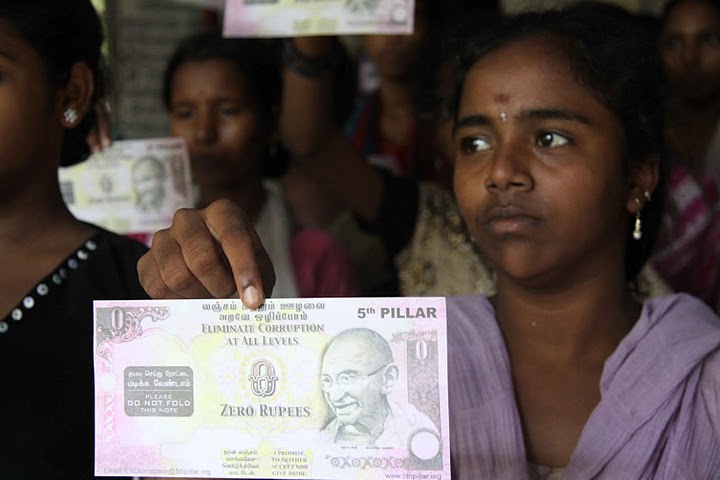“Very inspiring movie: I think some tools and tactics covered in the movie, can be used in Georgia too.”
English | Español | ျမန္မာစာ | Беларуская

|
|
English | Español | ျမန္မာစာ | Беларуская |
|
Fighting corruption in India with the Zero RupeeWhen Vijay Anand moved to the US from India to start his own software company, he realised how much more he could achieve when he didn't have to deal with corrupt officials.“It got me thinking about how citizens in India could fight the corruption that affects them every day.” In 2006 he founded the NGO 5th Pillar; the following year he returned to his home state of Tamil Nadu armed with a brilliant idea which he would use to launch 5th Pillar and to fight corruption: the Zero Rupee note. The Zero Rupee note is a visual aid to mobilise people to say 'no' to corrupt officials and to expose where and when bribes are demanded. Its design is based on the Indian 50 Rupee note. But printed on the note in English and Tamil is the message: “Eliminate Corruption at all levels” and “I promise to neither accept nor give a bribe”. The idea is that when a corrupt official suggests a citizen should pay a bribe to get something done, s/he can hand over the Zero Rupee note. On the back of the note are the goals, contact details and the website address of 5th Pillar. Vijay explains, “I realised corruption is affecting everyone, rich and poor, in a vicious cycle. To fight it I knew that we would need to focus not just on a small group of activists but on getting all citizens involved.” Within two years one million notes had been printed and distributed. As the notes circulated, so too did the organisation's volunteer base, which is now at 14,000.
In 2008 the concept went global with the launch of ZeroCurrency.org. Volunteers worldwide helped build the website which provides anti-corruption notes in the currencies of the 196 UN-recognised nations. Vijay says they've since been contacted by organisations and groups in six different countries who are taking steps to replicate the model. But what's important, he says, is that they first look at the local context and consider how the idea will be received. “Before I implemented the Zero Rupee note in India I tested it by using it myself and I looked carefully at how corrupt officials responded. They were usually ashamed and worried and immediately changed their attitude. In Tamil Nadu officials now know who 5th Pillar are and they know we will follow through if we learn they have taken or asked for a bribe or if they make any threats to someone who won't pay a bribe.” Now that 5th Pillar's work has been proved effective and sustainable, their mission is to expand and get the Zero Rupee note operating all over India.
REACH: Tamil Nadu in India, expanding across India and worldwide through Zero Currency. COST: 5th Pillar is supported by its members and by donations. Each Zero Rupee note costs around 1 Rupee to produce ($0.02). RESOURCES: TIME: 6 months research by the founder to research corruption, test the concept, print the first notes and organise a launch event. VOLUNTEERS: needed to popularise the project, use the notes and keep momentum. LEVEL OF DIFFICULTY: 2 out of 5 for the concept but 4 out 5 for widespread coordination of outreach and volunteers. LINKS TO LEARN MORE: Campaign page of the Zero Rupee note and the Zero Currency website. Articles in the The Economist, The Independent and Foreign Policy Digest  Images by 5th Pillar. Top: The Zero Rupee note in Tamil language. Middle: The audience holding up their Zero Rupee note and take a pledge not to give or accept bribes. Bottom: Audience members holding up their Zero Rupee note.
» |
“Very inspiring movie: I think some tools and tactics covered in the movie, can be used in Georgia too.”
Tiko Tsomaia,
Journalist,
Georgia
|